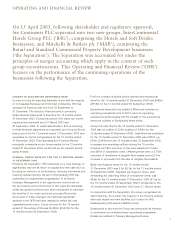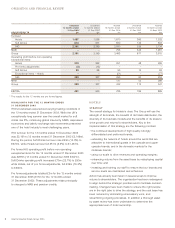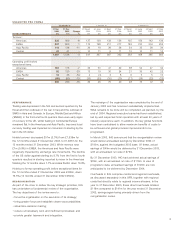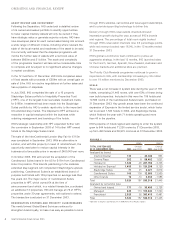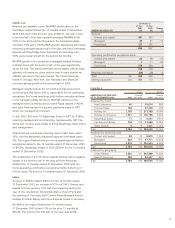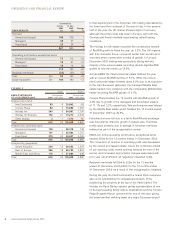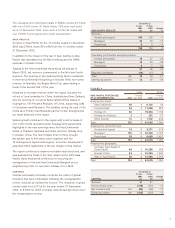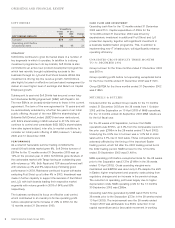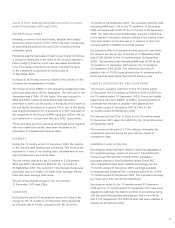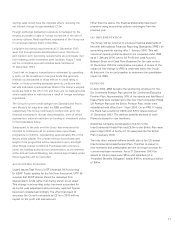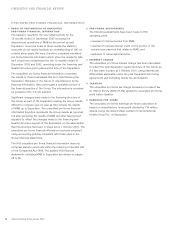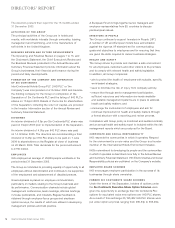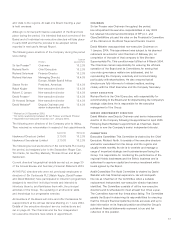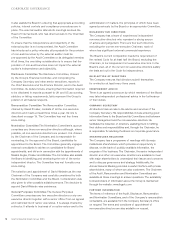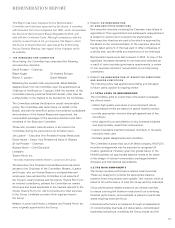Holiday Inn 2003 Annual Report Download - page 13
Download and view the complete annual report
Please find page 13 of the 2003 Holiday Inn annual report below. You can navigate through the pages in the report by either clicking on the pages listed below, or by using the keyword search tool below to find specific information within the annual report.sterling rates would have the opposite effect, reducing the
net interest charge by approximately £13m.
Foreign exchange transaction exposure is managed by the
forward purchase or sale of foreign currencies or the use of
currency options. Most significant exposures of the Group are
in currencies that are freely convertible.
Long-term borrowing requirements at 31 December 2003
were met through bonds denominated in euro. Short-term
and medium-term borrowing requirements are principally met
from drawing under committed bank facilities. Figure 7 sets
out the committed and uncommitted bank facilities at
31 December 2003.
Credit risk on treasury transactions is minimised by operating
a policy on the investment of surplus funds that generally
restricts counterparties to those with an A credit rating or
better, or those providing adequate security. Limits are also
set with individual counterparties. Most of the Group’s surplus
funds are held in the UK or US and there are no material funds
where repatriation is restricted as a result of foreign exchange
regulations.
The Group’s current credit ratings from Standard and Poor’s
and Moody’s for long-term debt are BBB and Baa2
respectively. The Group continues to comply with all of the
financial covenants in its loan documentation, none of which
represents a material restriction on funding or investment policy
in the foreseeable future.
Subsequent to the year end the Group has announced its
intention to commence an on-market share repurchase
programme for £250m, representing approximately 6% of the
issued share capital. The precise timing of purchases and
length of the programme will be dependent upon, amongst
other things, market conditions. Purchases will commence
under the existing authority from shareholders, to be renewed
at the Annual General Meeting. Any shares repurchased under
this programme will be cancelled.
ACCOUNTING POLICIES
Urgent Issues Task Force (‘UITF’) Abstract 38 ‘Accounting
for ESOP Trusts’ applies for the first time this period. UITF 38
requires that ESOP shares should be deducted from
shareholders’ funds rather than being shown as an asset.
This change in accounting policy has been accounted for
as a prior year adjustment and previously reported figures
have been restated accordingly. The effect has been to
decrease the Group’s net assets by £31m in 2002 with no
impact on the profit and loss account.
Other than the above, the financial statements have been
prepared using accounting policies unchanged from the
previous year.
IAS IMPLEMENTATION
The Group will be required to produce financial statements in
line with International Financial Reporting Standards (‘IFRS’) for
accounting periods starting after 1 January 2005. This will
require an opening balance sheet to be prepared under IFRS
as at 1 January 2004, and a full Profit and Loss Account,
Balance Sheet and Cash Flow Statement for the year ended
31 December 2004 for comparative purposes. A review of the
impact of the change to IFRS is underway within the Group.
At this point it is not yet possible to determine the quantitative
impact of IFRS.
PENSIONS
In April 2003, MAB became the sponsoring employer for the
Six Continents Pension Plan and the Six Continents Executive
Pension Plan. Approximately 30% of the assets and liabilities of
these Plans were transferred to the new InterContinental Hotels
UK Pension Plan and the Britvic Pension Plan, which were
established with effect from 1 April 2003. On an FRS 17 basis,
the Plans had a deficit of £46m and £76m respectively at
31 December 2003. The defined benefits sections of both
Plans are closed to new members.
Additional Company contributions of £4.5m to the
InterContinental Hotels Plan and £8.0m to the Britvic Plan were
paid in April 2003. A further £1.0m was paid into the Britvic
Plan in January 2004.
The only other material defined benefit plan is the US based
InterContinental Hotels Pension Plan. This Plan is closed to
new members and pensionable service no longer accrues for
current employee members. As at 31 December 2003 the
assets at market value were $85m and liabilities (on a
‘Projected Benefits Obligation’ basis) $181m, showing a deficit
of $96m.
11


